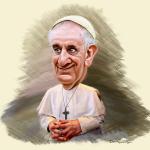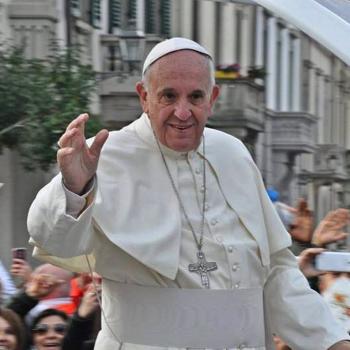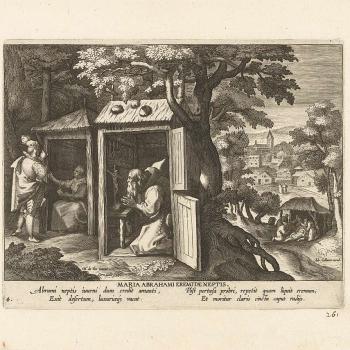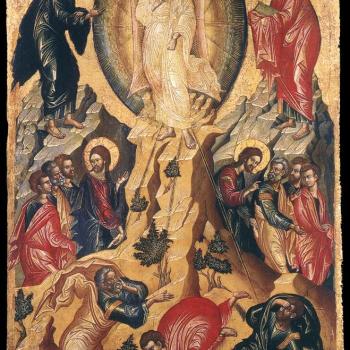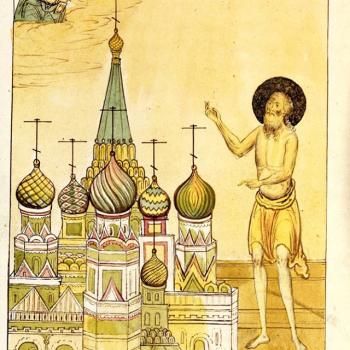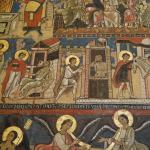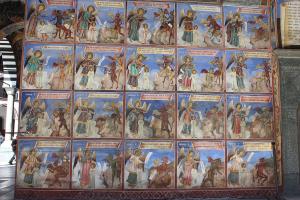
One of the most controversial topics in contemporary Eastern Christian discussions (Orthodox and Catholic) is that of the so-called toll houses (telonia, τελωνεία). Many Orthodox object to the notion of the toll houses, saying it is heretical, while others point out that belief in them has not only never been condemned, but finds itself represented by many important saints and theologians. The general notion of the toll houses is that upon death, every person will find themselves challenged by demonic powers which will try to lay claim to their soul due to the sins the person is attached to at the time of their death. The soul is said to ascend into the sky (heavens), where it will confront a series of demonic powers, each vying for control over the soul. If a demonic power, which represent one kind of sin or another, finds a soul tainted by the sin under its dominion, it will be able to lay a claim on the soul, preventing it from ascending further. If such a power finds the soul is not contaminated in that fashion, it will not be able to impede the soul, and so the so will ascend further, encountering another demonic power, until at last, it will have gone through a whole series of powers (often, said to be around twenty), and it will be able to ascend beyond the visible heavens and enter the heaven of heavens or the kingdom of God.
The notion of the toll houses arises in part from various interpretations of Scripture, especially from Ephesians 2:2, where it mentions the “prince of the powers of the air.” This prince tends to be said to be Satan, and the powers of the air are the demonic powers which try to control and manipulate those upon the earth even as they will try to claim the souls of those who have recently died. While the verse certainly shows where the idea of demonic powers in the air arises in the Christian tradition, the systematic presentation of the toll house theory also engages other sources, from the ancient cosmological understanding of the universe, early, to pre-Nicene theological reflections, and finally writings by saints, or hagiographical sources, which present their spiritual experiences.
Ancient cosmology suggested we live in a universe in which the physical earth is where material beings resides. Spiritual beings are said to reside in the sky, and the heaven of heavens beyond the sky which we can see. Physical matter keeps us weighed down, as do sins, while a pure spiritual being, such as that of a pure soul after death, will be able to move beyond the physical earth and attain spiritual glory. Thus, the notion is that upon death, every soul will try to ascend beyond what we see in the sky, to paradise, but souls can be and will be “weighed down” due to sin. Now, this does not mean the soul which gets stuck in this fashion will find it will be a permanent entrapment, but rather, such souls, due to prayers and grace, can be purified, cleansed from sin, and move on, eventually ascending to the kingdom of God.
Many critics of the teaching of the toll houses suggest that it follows a pre-Christian, works-based understanding of salvation. They see it influenced by the pre-Christian Egyptian notion of how the soul will be judged at death, a notion which did not include Christ into the equation. Others claim the notion is Gnostic, because it seems to suggest that there is something inherently wrong about material creation. Others say it is a crude theological speculation based upon an outdated cosmological notion. Such criticisms have value, especially as they do represent problems in some of the ways the toll houses can be presented. Nonetheless, they do not get to the core of the teaching itself. They deal, at best, with the surface level of the teaching, and an over-literal understanding of what is said based upon that surface-level. In reality, many contend against the toll houses because they have their own theological system and speculation which they are trying to promote, one which they find runs into problems if there is some truth to the notion of the tolls houses.
Christianity has room for all kinds of theological opinions and speculations, so long as such opinions and speculations do not impede or reject basic Christian dogmatics. Christians can speculate and try to answer difficult questions, coming to different conclusions with each other, without needing to condemn each other. And, truth be told, if one looks at the toll houses, not in a literal sense, but rather, like much of Scripture, for the spirit or intent behind the teaching, it is easy to find acceptable, indeed, to be a theological notion which has much to offer. Here, it can be said to be a rather basic idea, one which is important to uphold: during life, but also, after death, we are on a spiritual journey, and as we make our way upon that journey, we will both have to deal with the consequences of our actions, but also, we will have to find a way to detach ourselves from whatever bad habits or sins we have developed before we can fully find our place within the kingdom of God. This is also the point of the teaching of purgatory in Catholicism, and perhaps, because of the common basis between the two teachings, we have a reason why many Orthodox have become rather antagonistic to the notion of the toll houses: they are letting their anti-Catholicism influence their thinking. If such Orthodox were to read the vast literature which serves both the notion of the toll houses and purgatory, they would notice it has consistently been accepted and believed by some of the greatest theologians and saints, not just in recent times, but even before the council of Nicea. Thus, for example. Origen, in his homilies on the Psalms, gives us an early representation of this tradition:
For the prince of the world and the powers of the air come to each individual soul as it leaves this world, and look to see if they can find something of their own in it. If they discover greed, it belongs to them; if they find wrath, or wantonness, or envy, or anything of the like, it belongs to them, them claim it for themselves, they draw it to themselves, and turn it aside to the portion assigned to sinners. But if one has followed the example of him who said, “Behold, the prince of this world comes, and he does not find anything in me” if one will keep careful watch over himself in this way, these sinful beings indeed come, seeking what is their own in him, and, finding nothing, they will nonetheless assail him in an effort to divert him by force to their side. But the Lord will rescue him from sinners. And perhaps this is why we are commanded – with a kind of mystery – to also pray for this, when we say, “And deliver us from the Evil One.”[1]
While Origen suggests that we will undergo trials after death, he also points out how the faithful Christian will be rescued by Christ, so that we do not have to undergo the trial all by ourselves. How Christ does so, and how many trials we will face, is not answered here. But, what is important, is that Origen connects the notion of such trials with Christ, showing that, even if he is influenced by a pre-Christian tradition, he has already baptized it, making sure that it is Christ who has the final say, not the demonic powers trying to entrap souls. Christ is the true and final judge and savior of souls, making it clear that those who object to the notion of the toll houses because they think it does not offer a place for Christ and Christ’s work in its speculation, have not really examined the tradition.
While Origen’s homily shows us that the basic notion of the toll houses can be found discussed before the council of Nicea, one text used by those who believe in the toll houses is that of St. Athanasius’ Life of Antony. It can be seen as a bridge between the pre-Nicene era to the post-Nicene era, as Antony lived and thrived in both:
And he had also this favour granted him. For as he was sitting alone on the mountain, if ever he was in perplexity in his meditations, this was revealed to him by Providence in prayer. And the happy man, as it is written, was taught of God. After this, when he once had a discussion with certain men who had come to him concerning the state of the soul and of what nature its place will be after this life, the following night one from above called him, saying, ‘Antony, rise, go out and look.’ Having gone out therefore (for he knew whom he ought to obey) looking up, he beheld one standing and reaching to the clouds, tall, hideous, and fearful, and others ascending as though they were winged. And the figure stretched forth his hands, and some of those who were ascending were stayed by him, while others flew above, and having escaped heaven-ward, were borne aloft free from care. At such, therefore, the giant gnashed his teeth, but rejoiced over those who fell back. And immediately a voice came to Antony, ‘Do you understand what you see?’ And his understanding was opened, and he understood that it was the passing of souls, and that the tall being who stood was the enemy who envies the faithful. And those whom he caught and stopped from passing through are accountable to him, while those whom he was unable to hold as they passed upwards had not been subservient to him. So having seen this, and as it were being reminded, he struggled the more daily to advance towards those things which were before.[2]
Here, Antony is shown to perceive what Origen suggested, that souls will be challenged after death and that those who were still stained with sins, that is, those who had something which they were still to be held accountable for, will be prevented from attaining their goal, the heaven of heavens, due to the demonic power which will stop them. Antony does not indicate how long the soul would be held accountable, but only that it will be; it seems he wanted to use his experience to promote a moral lesson, that is, to explain why it is important to pursue virtue during life. We can see, in the writings of St. John Cassian, that this notion continued to be believed and discussed by the desert fathers and mothers:
For whatever we have done with a view to human glory we know that we have stored up for ourselves as a treasure on earth, according to the Lord’s words, and that consequently, having been as it were hidden in the soil and buried in the earth, it will be ravaged by different demons and consumed by the devouring rust of vainglory and so eaten up by the moths of pride that will be of no use or profit to the person who hid it. [3]
Abba Serenus, according to Cassian, held that it was a grace which God gave to us not to see the spiritual realm which lies all around us, for if we did, we would perceive those demonic powers of the air and they would frighten us:
But this air which is spread out between heaven and earth is so think with spirits, which do not fly about in it quietly and aimlessly, that divine providence has quite beneficially withdrawn them from human sight. For human beings, utterly unable to gaze upon these things with fleshly eyes, would be overwhelmed by an unbearable dread and faint away because of their frightening confluence and the horrible expressions that they can take upon themselves and assume at will. [4]
We can find further discussion of this topic in various sayings collections of the desert fathers. For example, an anonymous elder pointed out that we should prepare death with prayer, so that, when we die, we can have God’s help:
Again he said: “It is good to raise the hands in the air when praying and to beg of God that, when the soul departs, it might pass in tranquility through all those that attempt to obstruct it in the air.” [5]
The sayings also point out that there are many ways the virtues we develop in our life, or even at the moment of death, can become a vessel of grace which helps protect us from the demonic powers which will challenge us in our death:
There was once a person who repented and lived in hesychia. Almost immediately he chanced to stumble on a stone and to be stricken in his foot, so that he lost a great deal of blood and, fainting away, gave up his soul. The demons came wanting to take his soul, but the angels said to them: “Look at the stone and see the blood he shed for the Lord” and, when the angels said this, his soul was set free. [6]
This is, once again, exemplified in the Life of Antony, in which we find Antony, while still alive, was seen to move beyond the reach of such demonic powers due to his virtues, showing that they can help us, not only in death, but during our life as well:
And many monks have related with the greatest agreement and unanimity that many other such like things were done by him. But still these do not seem as marvellous as certain other things appear to be. For once, when about to eat, having risen up to pray about the ninth hour, he perceived that he was caught up in the spirit, and, wonderful to tell, he stood and saw himself, as it were, from outside himself, and that he was led in the air by certain ones. Next certain bitter and terrible beings stood in the air and wished to hinder him from passing through. But when his conductors opposed them, they demanded whether he was not accountable to them. And when they wished to sum up the account from his birth, Antony’s conductors stopped them, saying, ‘The Lord has wiped out the sins from his birth, but from the time he became a monk, and devoted himself to God, it is permitted you to make a reckoning.’ Then when they accused him and could not convict him, his way was free and unhindered. And immediately he saw himself, as it were, coming and standing by himself, and again he was Antony as before. Then forgetful of eating, he remained the rest of the day and through the whole of the night groaning and praying. For he was astonished when he saw against what mighty opponents our wrestling is, and by what labours we have to pass through the air. And he remembered that this is what the Apostle said, ‘according to the prince of the power of the air .’ For in it the enemy has power to fight and to attempt to hinder those who pass through. Wherefore most earnestly he exhorted, ‘Take up the whole armour of God, that you may be able to withstand in the evil day,’ that the enemy, ‘having no evil thing to say against us, may be ashamed.’ And we who have learned this, let us be mindful of the Apostle when he says, ‘whether in the body I know not, or whether out of the body I know not; God knows.’ But Paul was caught up unto the third heaven, and having heard things unspeakable he came down; while Antony saw that he had come to the air, and contended until he was free.[7]
It is possible to find countless examples like this throughout Christian history, such as The Dialogues of St. Gregory the Great, where various aspects of the toll house theory and the way demons challenge the soul after death can be found. They reveal ways we can understand how God’s grace works with us to purify our soul, which is why the idea should not be seen as some kind of Pelagian speculation.
Thus, the reason why many consider the notion of the toll houses to be heresy tend to be based upon a misunderstanding of the teaching itself. They object to it thinking it denies the role of Christ and grace, in salvation. Certainly, some ways the toll houses can be discussed might go astray, but this does not mean the whole tradition behind them does this. As it is speculative, and not dogmatic, the theory itself, especially in its systematic presentation, does not need to be believed, however, there are elements of it which should be, such as the fact that the soul, even after death, can and will undergo purification and transformation before its entrance into the eschatological kingdom of God. Denying this will deny God’s mercy and grace for most people, making it much more difficult for someone to be saved, as few will die completely without some sort of attachment to sin in their lives. The basic notion of the toll houses, as with purgatory, is quite theologically sound. We must deal with the consequences of our actions in this world, and if we have not resolved them and the bad habits and attachments they have made at the time of death, we will have to undergo more transformation and purification before our own glorification in Christ. Those who find this troubling, thinking it means Christ is taken out of the equation, must look to themselves in the here and now and ask themselves if their faith has made it that they are already perfect? If not, then why should they believe they will be perfect at death? Christ works with us in life and in death, helping us go from where we are, to the perfection and beatification we desire, but in a way which takes our lives seriously; it is not those who accept the toll houses who should be viewed as Gnostics, but rather, some of its harshest critics, as they seem to entirely denounce the implied meaning behind them, for in the end, their theological notions suggest that our earthly lives and actions do not matter.
[1] Origen, Homilies on Psalms 36-38. Trans. Michael Heintz (Washington, DC: CUA Press, 2023), 169 [Homily 5, Psalm 36 [37]]. Toll Houses.
[2] St. Athanasius, Life of Antony in NPNF2(4): 213-4
[3] John Cassian, The Conferences. Trans. Boniface Ramsey, OP (New York: Newman Press, 1997), 63. [First Conference; Abba Moses].
[4] John Cassian, The Conferences, 298 [Eighth Conference; Abba Serenus].
[5] John Wortley, trans., The Anonymous Sayings Of The Desert Fathers: A Select Edition And Complete English Translation (Cambridge: Cambridge University Press, 2013), 359 [N525].
[6] John Wortley, trans., The Anonymous Sayings Of The Desert Fathers, 73 [N.88/18.47].
[7] St. Athanasius, Life of Antony in NPNF2(4): 213.
Stay in touch! Like A Little Bit of Nothing on Facebook.
If you liked what you read, please consider sharing it with your friends and family!
N.B.: While I read comments to moderate them, I rarely respond to them. If I don’t respond to your comment directly, don’t assume I am unthankful for it. I appreciate it. But I want readers to feel free to ask questions, and hopefully, dialogue with each other. I have shared what I wanted to say, though some responses will get a brief reply by me, or, if I find it interesting and something I can engage fully, as the foundation for another post. I have had many posts inspired or improved upon thanks to my readers.


